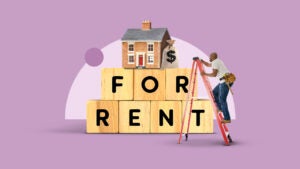Is 700 a good enough credit score to buy a house?

Key takeaways
- Credit scores typically span from 300 to 850 — the higher your score, the better.
- Different mortgages have different minimum credit score requirements. Generally, higher scores will qualify for lower interest rates.
- Paying your bills punctually and paying down outstanding debts can help raise your credit score.
When you’re financing the purchase of a home, it’s important to understand what mortgage lenders look for when evaluating potential borrowers. One factor they strongly value is your credit score, a measure of how creditworthy you are: The higher your score, the more attractive you will appear to lenders.
FICO and VantageScore, two of the most prominent players, score in a range from a low of 300 to a high of 850. Ideally, your credit score is closer to that high end. But what if your credit score is a bit lower than ideal? For example, is 700 a good credit score to buy a house? Here we’ll break down recommended scores for different types of mortgage loans, and whether you can buy a house with a 700 credit score.
What credit score do I need to buy a house?
“There are four major factors mortgage companies typically use to make decisions when lending money: credit score, income, assets and payment history,” says Ralph DiBugnara, a senior vice president at Cardinal Financial and founder of Home Qualified. “A good credit score is the only one that will directly impact the interest rate you will receive as a borrower, so it has the largest impact long-term.”
Higher scores signify better credit, but what is considered a “good” score? Most mortgage lenders will likely use FICO credit scores, and though FICO and VantageScore scales differ slightly, a score of 700 is considered “good” by both companies. Here’s how both break down the range of 300 to 850:
| FICO | VantageScore | |
|---|---|---|
| Sources: FICO and VantageScore | ||
| Excellent/exceptional | 800–850 | 781–850 |
| Very good | 740–799 | n/a |
| Good | 670–739 | 661–780 |
| Fair | 580–669 | 601–660 |
| Poor | 300–579 | 500–600 |
| Very poor | n/a | 300–499 |
A 700 credit score might not be the very top of the scale, but it shouldn’t disqualify you from any of the major home financing options available. So yes, 700 ought to be a good enough credit score to buy a house. In fact, says DiBugnara, “a credit score of 680 or above will likely give borrowers access to 95 percent of financing options available.”
What types of loans can I get with a 700 credit score?
A FICO score of 700 is above the minimum requirement for most types of home loans — even jumbo loans for more expensive homes.
Conventional loan
Conventional conforming loans usually have a minimum credit score requirement of 620 for fixed-rate mortgages and 640 for adjustable-rate mortgages. “However, to secure more preferred interest rates and terms on a conventional loan, a credit score of 700 or above is advisable,” says Rick Gruebele, owner/broker at Visions First Realty in northern Wisconsin.
FHA loan
A mortgage guaranteed by the Federal Housing Administration requires lower minimum credit scores than many conventional loans, which makes them particularly popular with first-time purchasers (although you don’t have to be a first-time buyer to use an FHA loan). A credit score of only 500 is needed so long as you put down a down payment of 10 percent or higher; with a score of 580 or higher, you need only put down at least 3.5 percent.
VA loan
Active-duty military service members, veterans and surviving spouses may be eligible for a VA home loan. “The VA does not set a minimum credit score requirement,” Gruebele says. “But lenders may have their own standards. A credit score of 620 or higher is often necessary to secure favorable VA loan terms.”
USDA loan
A loan backed by the U.S. Department of Agriculture caters to purchasers buying in eligible rural regions, and a credit score of 640 or higher is usually required.
Jumbo loan
Jumbo loans provide funds for larger-than-normal borrowing needs that exceed conforming loan limits. “Jumbo loans generally require a minimum credit score of 700 or higher,” says Kevin Martini, a certified mortgage advisor with Martini Mortgage Group at Gold Star Mortgage Financial Group.
How does a 700 credit score impact how much house I can afford?
Your creditworthiness has a direct affect on how much you can afford to spend on a home. When lenders see you as low-risk they are more willing to offer you a low interest rate, which in turn means lower monthly payments over the life of the loan.
If you’re wondering whether you can buy a house with your “good” credit score of 700, you likely can. But your total loan costs with a 700 score as opposed to, say, 760 are significantly different.
Let’s use a 30-year fixed-rate mortgage loan for $300,000 as an example. According to FICO’s Loan Savings Calculator, a 700 credit score could secure an interest rate of 6.796 percent (as of mid-August 2023). In this scenario, your monthly payment would be $1,955. But with 760 you would qualify for the best interest rate available, 6.574 percent, which results in a monthly payment of $1,911. That extra $44 per month may not sound like much of a savings, but over 30 years, it equates to an extra $15,840 paid in total interest.
The same is true in the opposite direction of the scale: Your 700 score and $1,955 payment puts you in much better stead than a score of, say, 620, the minimum needed for a conventional loan. That number would bring the monthly payments way up to $2,235.
How can I improve my credit score?
Obviously, it’s well worth taking the time to improve your credit score before applying for a home loan. Here are several strategies that can help raise your score:
- Pay your bills on time: “The most impactful strategy for improving your credit score is consistently making timely payments,” says Martini. “This includes not just credit card bills but also other bills like rent, utilities and even cell phone bills.”
- Pay down your outstanding debt: “A high level of debt can negatively impact your credit score,” Martini says. Adds Gruebele: “Aim to lower your credit card balances to below 30 percent of the credit limit on each card. This will improve your credit utilization ratio, positively affecting your score.”
- Avoid opening new credit accounts: Applying for credit frequently can cause your score to creep downward. “Every time you apply for credit, a hard inquiry is made on your credit report,” says Martini. “This can negatively impact your credit score, mainly if you apply multiple times within a short period.”
- Avoid closing existing accounts too: Keep old credit accounts open, even if you no longer use them. The length of your credit history influences your score, Gruebele says, so old accounts that are all paid up can have a positive effect.
- Review your credit: Check your credit report and address any errors or discrepancies you spot. “Having a general understanding of what’s on your credit reports and making sure there are no inaccuracies is a great way to improve your score,” DiBugnara says. “Sometimes old trade lines, mistaken missed payments or collections can drag the score down.”
Aim to implement the tactics above at least six months before applying for a mortgage loan, to allow enough time for your actions to reflect in your credit score.
Next steps
If your credit score isn’t ideal, it might be smart to wait a bit before buying a house, to give yourself time to build it up — and set yourself up for lower payments. When you’re ready to start house-hunting, partner with a local real estate agent early in the game. An agent who’s knowledgeable about your specific area can guide your homebuying journey and help you find a home that meets both your needs and your budget.
FAQs
-
Yes. Assuming the rest of your finances are solid, a credit score of 700 should qualify you for all major loan programs: conventional, FHA, VA and USDA loans all have lower minimum requirements, and even jumbo loans require a 700 score at minimum.
-
The right time to purchase a home is when you are financially ready, says certified mortgage advisor Kevin Martini. If you have good job security with consistent earnings and can demonstrate creditworthiness — as reflected by your credit score — you should be well-positioned to qualify for financing and purchase now. However, mortgage rates and home prices are high right now, so if your job isn’t stable, you don’t have enough savings for a down payment or your credit score is low, it’s probably smarter to wait.
-
As a general rule of thumb, most financial experts suggest that your total monthly housing costs, including mortgage payment, property taxes and insurance, should not exceed 28 to 30 percent of your gross monthly income. For example, if you make $100,000 a year, that’s $8,333 per month. Twenty-eight percent of that is $2,333, so on that salary you can afford a home purchase that keeps your total monthly payments below $2,333.
Why we ask for feedback Your feedback helps us improve our content and services. It takes less than a minute to complete.
Your responses are anonymous and will only be used for improving our website.






